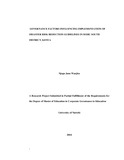| dc.description.abstract | The purpose of the study was to investigate factors influencing the
implementation of Disaster Risk Reduction guidelines in public secondary
schools in Meru South District, Kenya. The study sought to establish the extent to
which involvement of stakeholders in decision making, sensitization of the
community, availability of financial resources and monitoring of schools by
government agencies influenced the implementation of Disaster Risk Reduction
Guidelines in Meru South District. The study adopted a descriptive survey
research design. The study targeted 20 public boarding secondary schools, and 20
boarding masters in those schools. Findings revealed that principals involved the
stakeholders in decision making through parents meetings, students council
meetings and class meetings. It was also revealed that majority 18 (94.7%) of
housemasters indicated that the teachers assessed the premises daily and that the
students' leaders routinely monitored the premises. The study further revealed
that the schools put in place structures necessary for the implementation of
disaster risk reduction. Findings further revealed that majority 17 (98.5%) of
principals indicated that they did not have occupation certificate for occupied
buildings but they had grills removed from windows. Majority TS (68.4%) of
principals lacked disaster management training for staff. Based on the study
findings, the study concluded principals involved the stakeholders in decision
making through parents meeting, students council meetings and class meetings.
The study lastly concluded that the schools had inspection of the school by
Directorate of Quality Assurance and Standards Officers (DQASOs) but the
principals lacked disaster management training for staff and fire brigade personnel
talks and demonstrations. Based on the findings and conclusion made above, the
study makes the following rccorcmendations. that the school management should
initiate sensitization by way of creating awareness through parents meetings,
students meetings, assemblies, and rules and regulations; stakeholders to be
sensitized on disaster preparedness which either combats the disaster or
minimizes its effects. The school management should solicit for funds and budget
for the same in construction of safe infrastructure and purchase of equipment
necessary in disaster management. | en_US |

